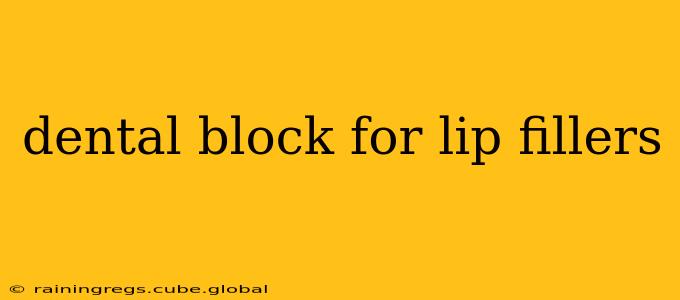Lip fillers have become increasingly popular for enhancing lip volume and definition. However, a common concern among patients is managing the discomfort associated with the procedure. A dental block, a type of local anesthetic injection, is often used to numb the lips and surrounding areas, providing a more comfortable experience. This guide explores dental blocks for lip fillers, addressing common questions and concerns.
What is a Dental Block for Lip Fillers?
A dental block is a type of local anesthetic injection used to numb a specific area of the mouth. For lip fillers, the dentist or qualified injector may use a dental block to numb the upper and lower lips, reducing or eliminating pain and discomfort during the procedure. This involves injecting a numbing agent, typically lidocaine or a combination of lidocaine and epinephrine, near the nerves that supply sensation to the lips. The type and quantity of anesthetic will depend on the individual patient and the injector's preference and experience.
How Does a Dental Block Work?
The anesthetic used in a dental block temporarily blocks nerve signals from the injection site to the brain, preventing the transmission of pain signals. This results in a numb feeling in the treated area, making the lip filler injection much more tolerable. The effects of a dental block typically last for several hours, ensuring comfort throughout the procedure and the immediate post-injection period.
What are the Benefits of Using a Dental Block for Lip Fillers?
The primary benefit of using a dental block for lip fillers is the significant reduction in pain and discomfort during the injection. This leads to a more relaxed and comfortable experience for the patient. Additional benefits include:
- Reduced Anxiety: Knowing that the procedure will be virtually painless can significantly reduce anxiety and apprehension about the treatment.
- Improved Patient Tolerance: A comfortable procedure allows for more precise filler placement by the injector as the patient remains still and relaxed.
- Enhanced Post-Procedure Comfort: The numbing effect can linger for a few hours after the procedure, minimizing any post-injection soreness or discomfort.
Is a Dental Block Necessary for Lip Fillers?
While a dental block significantly enhances comfort, it isn't strictly necessary for all patients. Some individuals have a naturally high pain tolerance or may only require topical anesthetic (numbing cream) for adequate pain management. The decision to use a dental block is typically made in consultation with the injector based on the patient's pain tolerance, the amount of filler being used, and the injector's preference.
What are the Risks Associated with a Dental Block?
As with any injection, there are potential risks associated with a dental block, although they are generally minor and rare. These include:
- Bleeding: Minor bleeding at the injection site is possible.
- Bruising: Bruising can occur at the injection site, but typically resolves within a few days.
- Infection: Infection is rare, but proper sterile technique by the injector minimizes this risk.
- Allergic Reaction: Allergic reactions to the anesthetic are uncommon, but possible. Patients with a known allergy to local anesthetics should inform their injector.
Does a Dental Block Affect the Results of Lip Fillers?
No, a dental block does not affect the results of lip fillers. The anesthetic only numbs the area temporarily; it does not interfere with the filler's ability to add volume or shape the lips.
How Long Does the Numbness Last After a Dental Block?
The duration of numbness varies depending on the type and amount of anesthetic used, as well as individual patient factors. Generally, the numbness from a dental block lasts for several hours, gradually wearing off over time.
What Should I Expect During a Lip Filler Procedure with a Dental Block?
The procedure typically begins with cleaning and disinfecting the lip area. The dentist or injector will then administer the dental block injection, which may cause a slight pinch or stinging sensation, but this is temporary. Once the area is adequately numb, the lip filler injection is administered. After the procedure, the injector may provide instructions for aftercare and monitor for any adverse reactions.
This information is for general knowledge and does not constitute medical advice. Always consult with a qualified medical professional for any health concerns or before undergoing any medical procedure. The experience of a dental block for lip fillers will vary between patients and injectors. Open communication with your practitioner is key to a comfortable and successful outcome.
